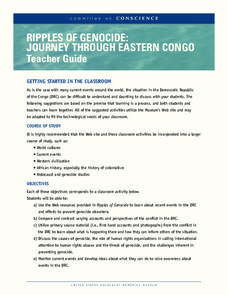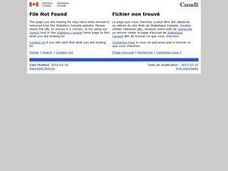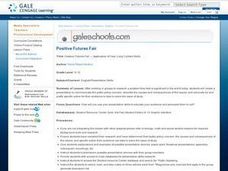iCivics
Mini-Lesson: The Incumbent Advantage
Does the person running for re-election have an advantage over the challenger? Scholars explore the concept of incumbent advantage during elections using an informative mini-instructional activity explaining the legislative branch. In...
iCivics
Mini-Lesson: Presidential Appointments
Can the president of the United States hire anyone he or she wants for any position in the executive branch? The answer may surprise scholars! After investigating the appointment process, historians, by themselves or in pairs, analyze...
iCivics
Step One: We've Got Issues
What is the most pressing issue in your community? The resource helps you and your middle schoolers begin the process of doing something about it! Learners compare and contrast two pressing issues in their local counties by reading two...
Judicial Learning Center
Article III WebQuest
Why is Article III of the constitution so significant? Pupils discover the importance of Article III and how it relates to past as well as current events by completing Internet research using a provided handout. They learn everything...
Stanford University
Civil Rights or Human Rights?
Young citizens consider the American civil rights movement as part of the global struggle for human rights. After using a timeline activity to learn about the major events in the civil rights movement, class members study Malcolm X's...
Curated OER
Lewis and Clark
Students investigate Lewis and Clark. In this Lewis and Clark instructional activity, students search the Internet for information about Lewis and Clark and the Corps of Discovery. Students use maps to understand the explorations and...
Curated OER
Inform Your Vote
Students examine and participate in the election process, analyze current event topics and offer their opinions. They then share their viewpoints on civic issues. They are encouraged to do additional research on the election's hot issues.
Curated OER
Rain Forest Reporters
Students work as magazine reporters to produce a print or multimedia magazine about rain forests.
Curated OER
Lose a Vote, Gain a Vote
Students explore the issues behind close Senatorial races. They investigate the qualities of political leaders, the 2002 senatorial elections and the differences and similarities between the Republican and Democratic parties.
Curated OER
History Trifold in Publisher
Students create a timeline of events happening around the world. In this timeline lesson plan, students use Microsoft Publisher to create a timeline of events happening around the world as they live their lives presently.
Curated OER
Conflict Resolution in the World Today: Introduction to Current World conflicts, their Antecendents, the Progression, and their Potential Conclusions
Students write a paragraph describing a conflict they had with a friend or a family member and a paragraph explaining how it was resolved. In this social science lesson, students share their paragraphs with a partner and then will...
Curated OER
What is Your Issue?
Students discuss and debate critical political and social issues facing the United States today.
Curated OER
Tackling Terror
Students discuss their fears of terrorism. For this terrorism lesson, students discuss the Madrid terror attacks, the history of terrorism, and share coping strategies.
Curated OER
Democracy in Action?
Students compare and contrast democratic election processes. In this 200 presidential election lesson, students visit websites that allow them to compare federal American elections to British elections. Students hold their own classroom...
Curated OER
Strangers in a Strange Land
Students participate in a round-table discussion about the ethnic Albanian refugee crisis occurring in Kosovo as a result of Serbian persecution. They examine another 20th century refugee crisis and compare its causes.
US Holocaust Museum
Ripples of Genocide: Journey through Eastern Congo
Could you locate the Democratic Republic of Congo on a map? Scholars investigate the genocide taking place in Eastern Congo. Groups explore web-based evidence as well as the Ripples in Genocide source to take a closer look at the issue....
Curated OER
Writing a Newspaper-Style Article
Help your secondary reader/writers assess texts by studying press releases from Statistics Canada and drafting articles based on them. They then compare the press release, their own articles, and actual news stories they find online. I'd...
Education World
A Walk Through The 20th Century
Students review the people, places, and events of a particular decade of the 20th Century. They write a report about that decade and create a booth of memorabilia, music, dress, pictures and other artifacts representing the time period.
US Holocaust Museum
Defying Genocide
Defying death. Defying those who want to do harm. Defying genocide. Pupils research the events in Rwanda to gain an understanding of what it takes to survive a horrific event like a holocaust. They use video, time lines, and Holocaust...
University of California
Principles vs. Practices
Have you ever wondered what your own World Order would look like? Scholars use primary and secondary documents as well as video clips to investigate and analyze the Cold War. Using the sources, the principles and practices of nations...
Curated OER
Historical Heroes
High schoolers determine whether the ends truly justify the means by examining the behavior of historical and fictional heroes. They view and discuss film versions of Gangs of New York and Les Miserables. Then they break into small...
APlusPhysics
Generate an Argument: Indian Point Nuclear Plant
Small groups in your physics class collaborate on researching and forming an opinion on whether or not to continue operating the Indian Point nuclear power plant in New York. Once the information is gathered and an argument developed,...
Curated OER
Puerto Rico: The 51st State?
Students explore Puerto Rico. In this Puerto Rico current events lesson, students conduct a Webquest to answer questions about Puerto Rico's culture. Students discuss whether Puerto Rico is a country or a state, and defend their...
Curated OER
Positive Futures Fair
Students, in groups, research an issue they feel is significant in today's world. They present and justify specific actions for the audience to take that would help to better the issue of public concern.

























